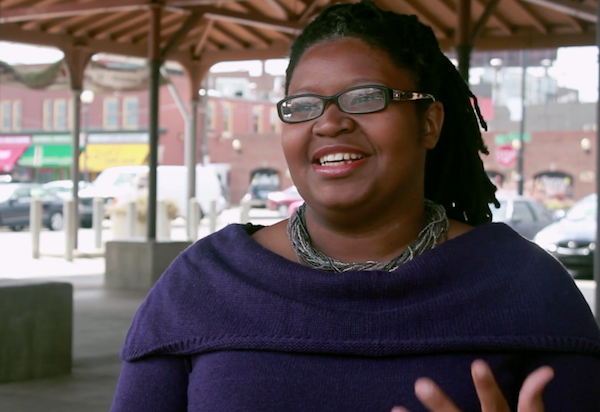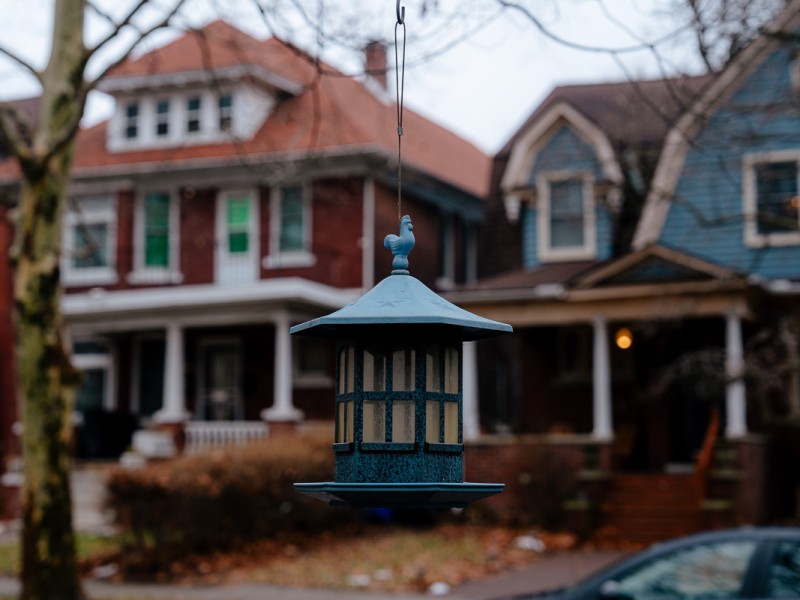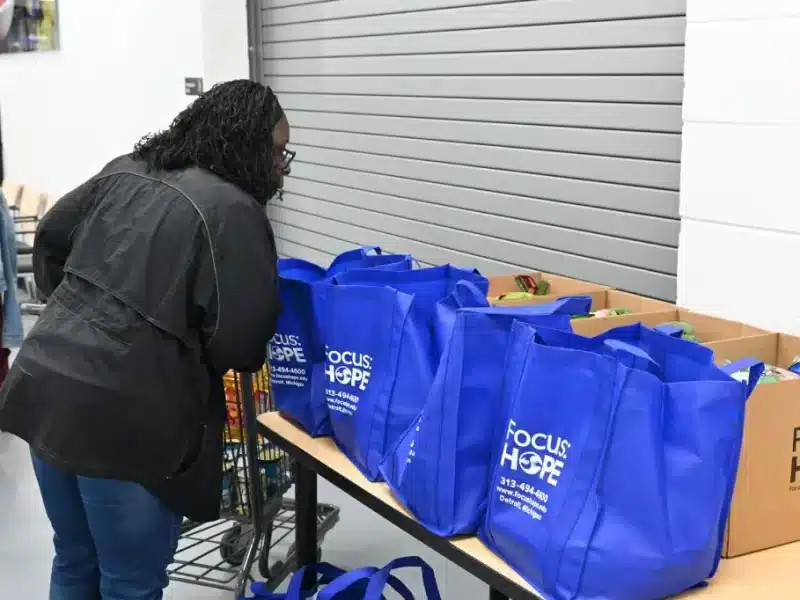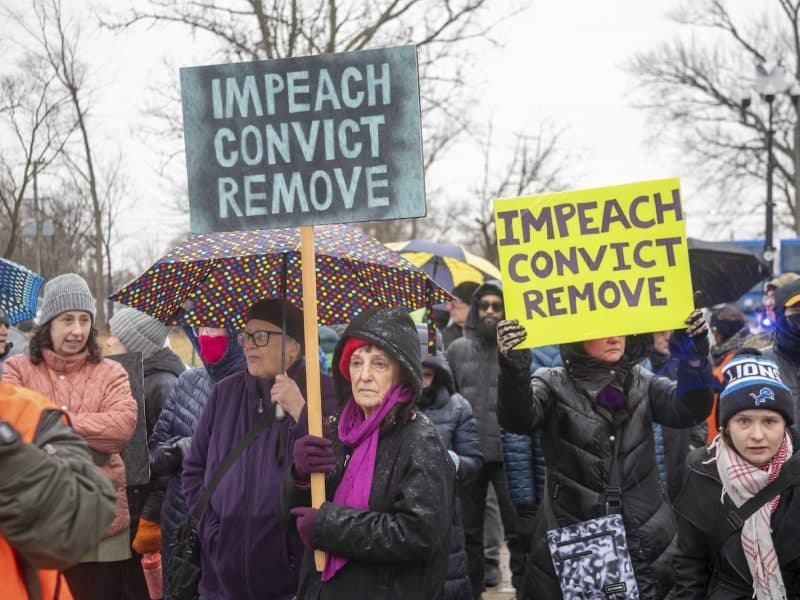Model D TV: LGBT leader of color Kibibi Blount Dorn
Before working with the Detroit Food Policy Council, Kibibi Blount Dorn assisted the Detroit Black Community Food Security Network and earned a Master's of Urban Planning from Wayne State University.

Kibibi Blount-Dorn loves food.
It's not just its flavors, smells and textures, or even the process of turning ingredients into a meal. For her, its about food's story from the farm to the table and the people and places it touches along the way.
“In this society and this city, good food is like a niche thing, sort of a fad,” she says. “People don’t think about it in terms of good food is something everyone has a right to access. It’s more like ‘oh, you’re one of those foofy vegetarians, and you eat healthy food and the rest of us just eat Doritos and Red Pop every day.'”
As she sips lavender-scented cappuccino in a coffee shop tucked among the sights and smells of foodie mecca Eastern Market, the 31-year-old program manager of the Detroit Food Policy Council talks about her passion for accessible healthy food and her craving for change.
Since accepting the job in February, Blount-Dorn has worked closely with the council’s 21 members from 12 community sectors who work on policy areas including food justice, access to healthy food and urban agriculture advocacy. Blount-Dorn is charged with outreach and education for the council as well as planning its events, including its annual Detroit Food Summit, which wrapped up in May and is scheduled for April 11-13 in 2013.
Prior to working with the DFPC, she assisted the Detroit Black Community Food Security Network with several urban gardening projects and earned a Master’s of Urban Planning from Wayne State University. While there, she studied with food planning scholar and DFPC member Kami Pothukuchi. She was writing her master’s essay on farmer’s markets and searching for a community-based planning position in 2009, at the same time the council was forming and the position was being created.
“I was like ‘That’s perfect, that’s exactly what I want to do,'” she says.
She says her favorite part of her “dream job” is meeting people passionate about different aspects of healthy food, from gardening to nutrition education and using her knowledge to enlighten others.
“People who are new to the idea come in and the moment when they get it, that’s one of my favorite parts,” she says, “the moment where they are like ‘food is something you do every day but it’s also this huge system’ and the way it operates and shapes your life and the fact that they play a part in it every day …I love that part.”
A Detroit native, she said she also loves working in a job that gives her a close-up look at the city and its residents working for change.
“I think the spirit of organization in Detroit is so unique,” she says. “I feel like organizers in Detroit sort of have this, ‘this is our city and whatever we can imagine, we can create it to be.’ We don’t have to be bound by any of these superstructures, we can build our own, build what we want to see here.”
For Blount-Dorn, that spirit ignited in her as a teenager when she worked with Detroit Summer, a multi-racial, intergenerational volunteer program started by famed Detroit activists James and Grace Lee Boggs in which teens design and realize summer projects, from gardening to mural building.
“It was like that intense face-to-face community interaction,” she says. “It gave communities a chance to see young people doing something good, but it also gave young people a chance to feel like they had something to contribute and we could shape our city into what we wanted to see instead of having to do good in school and move out of the city, which was sort of the message a lot of people get in schools.”
It also ignited her passion for urban gardening when she saw the myriad of benefits growing from the garden that expanded beyond what ended up on plates.
“My experience in urban gardens was that gardens were places where people learned things other than just about food and connecting to food,” she says. “I feel like community gardens were places where people connected with other people in their neighborhood and actually formed some of those relationships that it seems like we don’t make as often in our neighborhoods anymore, where people learn about food but they also learn about natural systems and the ecosystem and the fact that there’s this larger world community that they play a part in and there are a lot of intergenerational relationships going on. In gardens I feel like things that were making communities stronger were happening that weren’t happening in a lot of other places in the community.”
The program also taught her about the power of love, community and ideas, she says.
“We can’t just say ‘this system is bad and we’re gonna hate it and bash it,” she says. “Instead you have to come up with something better and build it and that’s when you have movement.”
She said the program taught her lessons about community building and organizing she uses every day at her job, but it also had another benefit. During one of those summers, she met her partner, Rachel Dorn, the sister of one of the staff members. The two have been together for 10 years and have a 4-year-old son, Sebastian.
For Blount-Dorn, the relationship had an unexpected result. A longtime vegetarian, she was surprised when she learned Dorn was a hunter.
“When we first started going out I was like ‘well if you really did shoot a deer, I would probably eat it,'” she says. “And for the first five or six years she never got anything when she went out hunting and after our son was born she started getting a deer every year.”
Blount-Dorn says the deer her partner brings home is the only meat she eats.
“I didn’t really support the food industry that was producing meat, the meat that was available in grocery stores,” she says. “That was the part I didn’t agree with, not necessarily the part about actually eating animals. I sort of feel like this deer lived in the woods for the past eight years and Rachel went and hunted it and she and her dad butchered it in the basement; its sort of like growing your own vegetable garden.”
And the timing of the addition of meat to her diet could not have been better. Their son suffers from a variety of food allergies and subsists mostly on meat. He’s also been picking up on some of his mother’s teachings, quite to Blount-Dorn’s surprise.
“He’ll be hanging out with his cousins and saying ‘we shouldn’t be drinking that red punch because it’s not as healthy for us as water or coconut milk,'” she says. “I’m like ‘where did you learn that?'”
And for Blount-Dorn, making changes through educating people about what’s on their plates is what it’s all about.
She said she hopes to continue working to promote healthy food and to make changes within her field, including more access for minorities in every sector of the industry, from farming to food service. The biggest change, however, would be broader access to food education.
“I’d like to see more people know about food systems and food work, what it is and how it benefits the community, at least be aware of where your food comes from,” she says.
And as for her job, she said she knows she’ll be done when there is no need for it.
“What I’m really working for is for us not to need this job,” she says. “I also feel like the work that we do, the dreams that we have are not so much for my job, it’s for the work that we do in the community. So I guess what I dream of for myself are things like being able to be a member of my community and contribute to improving the safety of the food, the education of community members. In those terms, I’m not where I want to be, I want to see myself grow in community work and life work.”
This story first appeared in Between the Lines, our media partner for this project.




